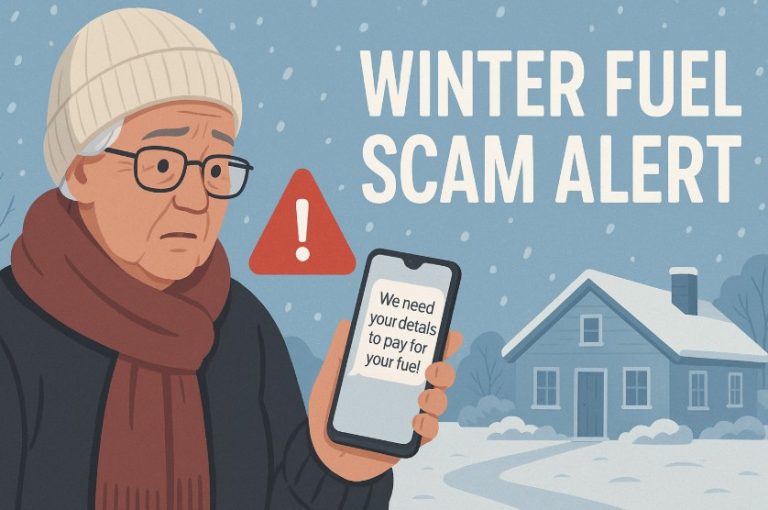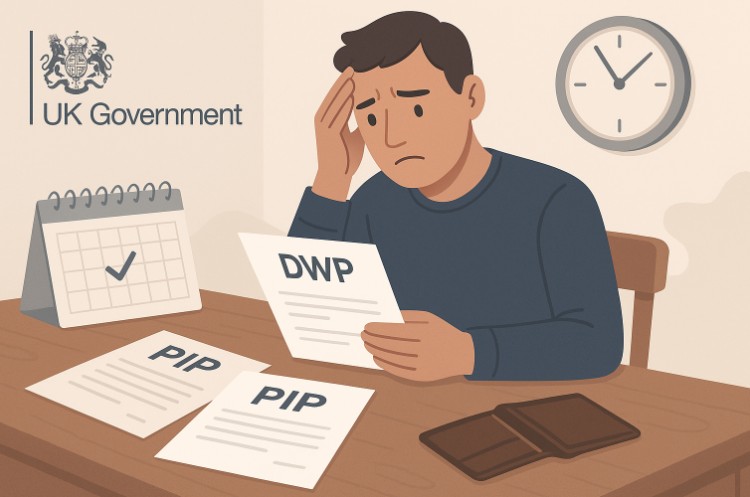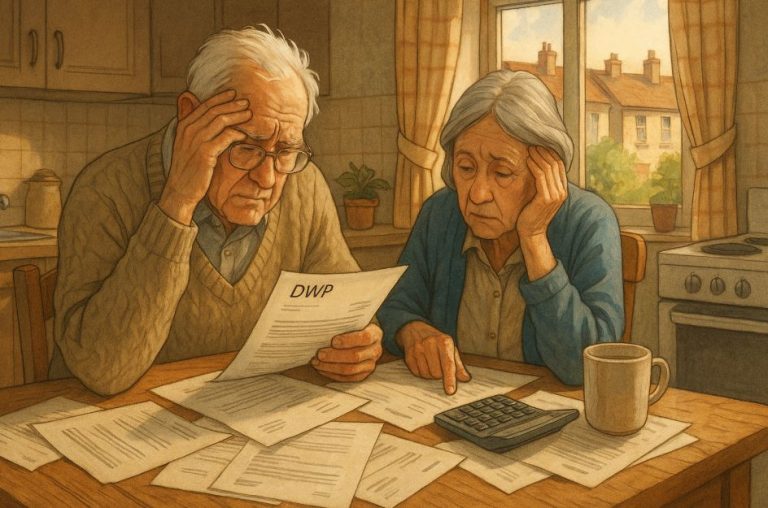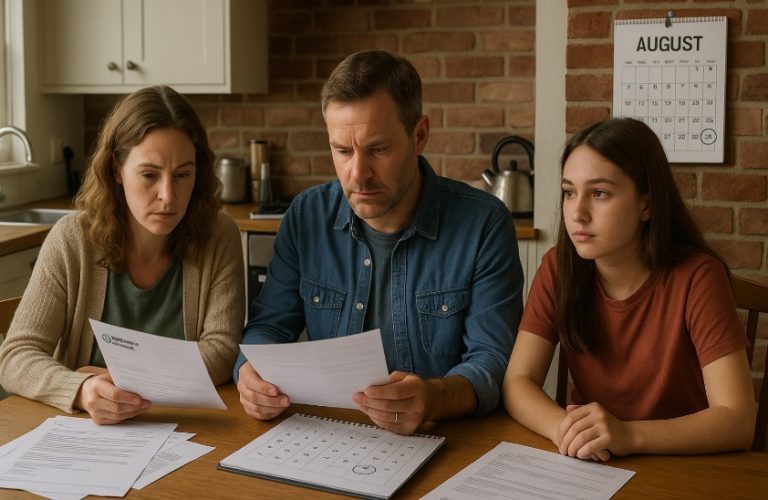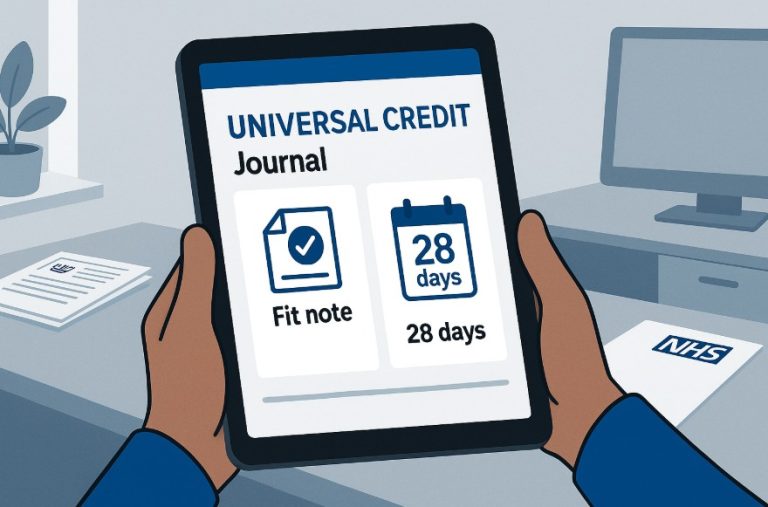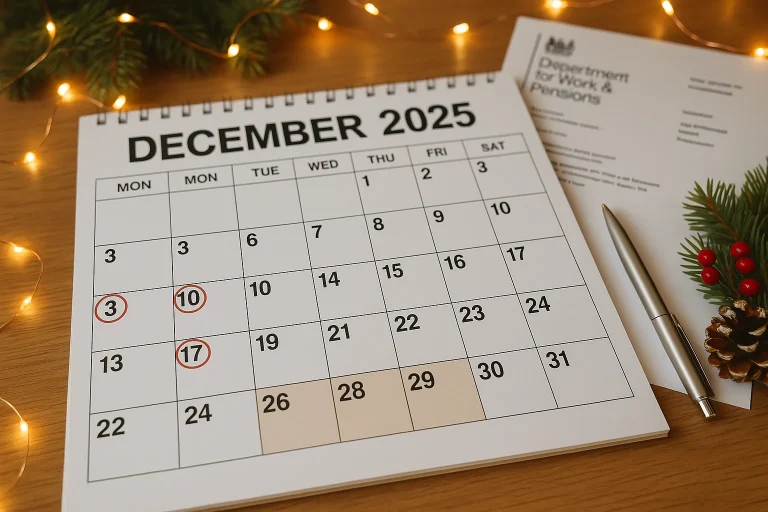Funerals in the UK can be expensive, often placing an unexpected financial burden on families.
For individuals already receiving certain benefits, the Department for Work and Pensions (DWP) offers a Funeral Expenses Payment – a form of financial support to help cover essential funeral costs.
This guide explores how much is a funeral grant from DWP, who is eligible, what it covers, and how to apply.
What Is the DWP Funeral Expenses Payment?
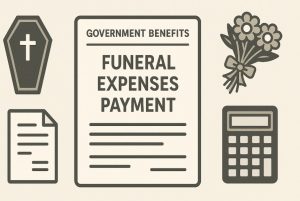
The Funeral Expenses Payment is financial support provided by the Department for Work and Pensions (DWP) to individuals on certain income-related benefits who are responsible for organising a funeral.
It is intended to help cover necessary funeral costs where the deceased person’s estate does not fully provide for the expenses.
This support is distinct from other bereavement-related benefits such as the Bereavement Support Payment, which is generally reserved for spouses or civil partners of the deceased.
The Funeral Expenses Payment is specifically tied to the claimant’s financial status and relationship with the deceased.
How Much Can You Get from the DWP Funeral Grant?
The amount awarded through the DWP Funeral Expenses Payment varies depending on several factors.
These include the type of funeral, any financial contributions from the deceased’s estate, and whether a pre-paid funeral plan is in place.
In most cases, the grant will not cover the full cost of the funeral, but it will contribute toward essential expenses.
Key elements typically covered:
- Burial fees for a particular plot
- Cremation fees, including the cost of the doctor’s certificate
- Travel expenses related to funeral arrangements
- The cost of moving the deceased’s body more than 50 miles within the UK
- Death certificates and other necessary documents
In addition to covering these core elements, applicants may also receive a fixed contribution of up to £1,000 towards other funeral-related costs. These additional costs may include items such as:
- Funeral director’s fees
- Coffin or casket
- Funeral flowers or transport
The actual amount received may be lower if the deceased had a pre-paid funeral plan. In such cases, the payment is reduced to cover only those costs not included in the plan, up to a maximum of £120.
Typical Payment Breakdown from DWP Funeral Grant
| Category | Amount Covered |
| Burial or cremation fees | Full or partial, depending on local authority |
| Doctor’s cremation certificate | Fully covered |
| Travel to funeral and arrangement | Reasonable travel costs, including over 50 miles |
| Transporting the body | Over 50 miles within the UK |
| Documentation (death certificate) | Fully covered |
| Additional funeral costs | Up to £1,000 |
| Pre-paid funeral plan support | Up to £120 if plan does not cover all costs |
The payment may also be adjusted if the deceased left behind any savings, insurance payouts, or other funds not tied to a property or personal possessions passed to a spouse or civil partner. This portion of the estate is considered when calculating the final grant amount.
Who Is Eligible for a Funeral Grant in the UK?
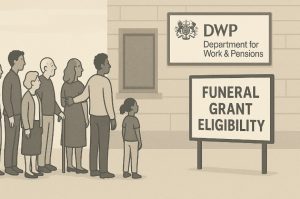
Eligibility for the DWP Funeral Expenses Payment is based on three key conditions:
- The applicant must be receiving at least one qualifying benefit
- The applicant must have a close relationship with the deceased
- The funeral must be held in the UK, European Economic Area (EEA), or Switzerland
Qualifying Benefits
Applicants or their partners must receive at least one of the following income-related benefits:
- Universal Credit
- Income Support
- Income-based Jobseeker’s Allowance
- Income-related Employment and Support Allowance
- Pension Credit
- Housing Benefit
- Support for Mortgage Interest loan
It is still possible to submit a claim while awaiting a decision on a new benefit application. The claim will be processed once the benefit is confirmed.
Relationship Requirements
Eligibility is dependent on having an appropriate relationship with the deceased. Accepted relationships include:
- The partner (married, civil partner or cohabiting)
- Parent of a stillborn baby (after 24 weeks of pregnancy)
- Parent or guardian of a deceased child under 16, or under 20 if in approved education or training
In some situations, a close relative or friend may apply if:
- The deceased had no partner when they died
- The person legally responsible for the funeral (such as a parent) is unable to claim because they live abroad, are imprisoned, or are not on qualifying benefits
The DWP may assess whether other relatives are available and financially able to pay before approving a grant.
What Does the DWP Funeral Grant Cover?
The DWP Funeral Expenses Payment is specifically designed to support low-income individuals with essential funeral-related costs.
While it is a helpful form of government support, it’s important to understand that it is not intended to pay for the entire funeral.
Instead, it contributes to necessary costs associated with arranging and carrying out a funeral in a dignified and lawful manner.
The grant covers a defined set of expenses. These are broken down into two main categories:
1. Mandatory or Essential Costs
These are costs the applicant is entitled to claim for if they are organising a funeral and meet eligibility requirements.
Essential costs typically covered include:
- Burial or cremation fees: This includes the cost of securing a burial plot or cremation service. The DWP covers these fees based on local authority rates. However, private cemeteries or crematoria may charge more, and the difference will need to be paid by the applicant.
- Doctor’s certificate for cremation: When cremation is chosen, a doctor must complete and sign a cremation form (form Cremation 4), which is legally required. The grant covers the cost of this certificate in full.
- Death certificates and legal documentation: The grant includes payment for the cost of registering the death and obtaining official death certificates, which are required for legal and financial processes following a person’s death.
- Transportation of the body: If the deceased’s body needs to be transported over 50 miles within the UK (for example, from a hospital to the funeral home or to a burial site), the cost is eligible for reimbursement under the grant.
- Travel expenses for the funeral organiser: Reasonable travel expenses are also covered if they are necessary for arranging or attending the funeral. This could include train or bus fares, or mileage if using a personal vehicle.
These expenses are generally reimbursed at standard public rates, and claims must be supported by valid receipts or invoices.
2. Additional Funeral Costs (Up to £1,000)
In addition to the essential expenses, claimants may receive a maximum of £1,000 to cover other necessary items and services associated with the funeral. This discretionary amount is meant to help cover:
- Funeral director’s fees: These typically include services such as arranging the funeral, completing paperwork, transporting the body, and conducting the ceremony. Because funeral director fees vary significantly depending on location and service level, the £1,000 cap may not cover the full amount.
- Coffin or casket: A standard coffin or casket, often provided by the funeral director, can be included in the amount allocated under the discretionary limit.
- Funeral flowers: Modest floral arrangements can be included if they form part of the official funeral invoice.
- Hearse or transport for the deceased: A basic vehicle used to transport the coffin to the burial or cremation site is often included under the additional expenses.
While the £1,000 allocation is helpful, many families may still find themselves responsible for extra costs, particularly if they choose upgraded services or non-essential items.
Costs That Are Not Covered
Despite its usefulness, there are a number of funeral-related expenses that the DWP Funeral Expenses Payment does not cover. Applicants should be prepared to fund the following from their own resources:
- Wake or post-funeral reception
- Catering for funeral guests
- Printed order of service booklets or personal memorial stationery
- Obituaries in newspapers or online listings
- Embalming services or cosmetic preparations for viewings
- Monument, headstone, or permanent memorials
- Cost of a religious minister or celebrant (unless included in the funeral director’s service)
These are typically considered optional or personal choices and fall outside the DWP’s definition of essential funeral needs.
Impact of a Pre-paid Funeral Plan
If the deceased had a pre-paid funeral plan, this significantly affects how much the DWP will pay. In such cases, the Funeral Expenses Payment is limited to £120, and only for items not already covered by the plan.
For example, if the funeral plan covers the cremation but not the flowers, the claimant may be able to receive support only for the floral costs, up to the £120 cap.
Applicants are advised to review the terms of any pre-paid funeral plan before submitting a claim, to avoid overlapping payments.
Summary of Covered vs Non-covered Costs
| Funeral Expense | Covered by DWP Funeral Grant |
| Cremation or burial fees | Yes |
| Doctor’s cremation certificate | Yes |
| Death registration and documentation | Yes |
| Transporting the deceased (over 50 miles) | Yes |
| Funeral director’s services | Partially (within £1,000 limit) |
| Coffin or casket | Partially (within £1,000 limit) |
| Flowers and transport | Partially (within £1,000 limit) |
| Pre-paid plan shortfall | Yes, up to £120 |
| Wake and refreshments | No |
| Obituaries and memorial cards | No |
| Embalming or cosmetic services | No |
| Religious leader or celebrant fees | No (unless bundled in director’s package) |
Understanding exactly what is and isn’t covered is vital for families managing funeral costs. Planning with realistic expectations can help prevent financial stress during what is already an emotionally difficult time.
How Is the DWP Funeral Payment Paid?
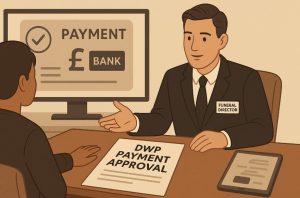
The method of payment depends on whether the claimant has already settled the funeral costs.
- If the funeral has already been paid for, the grant is reimbursed directly to the claimant’s bank, building society, or credit union account.
- If the funeral has not yet been paid for, the grant is usually paid directly to the funeral director or service provider.
Applicants should be prepared to present original receipts or invoices as part of their application. Claims may be delayed or refused if this documentation is missing or incomplete.
The payment does not affect tax status or ongoing benefit calculations, as it is not treated as taxable income.
How Do You Make a Claim for a Funeral Grant?
To qualify for a Funeral Expenses Payment, the claimant must submit an application within six months of the funeral date.
Early applications are permitted if the individual has a signed contract or invoice from a funeral director. However, estimates are not accepted.
Applications can be submitted using one of two methods:
- By telephone: Claimants can contact the DWP Bereavement Service by calling 0800 151 2012. Welsh language and textphone options are also available.
- By post: The SF200 claim form can be downloaded from the GOV.UK website and sent to the address listed on the form.
Claimants receiving Universal Credit will usually need to wait until after their next scheduled payment before receiving a decision on their application.
It is important to submit the form promptly, along with any required supporting documents. Failure to do so may result in reduced payments or rejection of the claim.
Can You Appeal a Funeral Grant Decision?
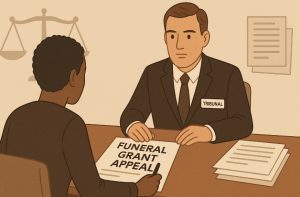
If the DWP refuses a claim or issues a payment that seems incorrect, the applicant has the right to appeal the decision.
The first step is to request a mandatory reconsideration, which involves the DWP reviewing the application and any additional evidence.
If the outcome remains unfavourable, the applicant can take the case to the Social Security and Child Support Tribunal.
Supporting documents, including receipts, benefit letters, and proof of relationship, should be submitted during the appeal process. It may also be beneficial to seek advice from Citizens Advice or a legal aid organisation when pursuing a formal appeal.
Conclusion
While the DWP Funeral Expenses Payment provides critical support, it may not cover all funeral costs.
It’s a helpful resource for those on a low income or receiving benefits, but families may still need to supplement the grant with personal funds or other financial aid.
If you’re arranging a funeral and think you may be eligible, it’s important to apply as soon as possible and ensure all required documentation is submitted. For further help, speak to the Bereavement Service or your local Citizens Advice.
FAQs About the Funeral Grant from DWP
Is there a maximum limit on DWP funeral payments?
Yes, the payment includes full coverage for certain items like cremation fees, but only up to £1,000 is provided for other funeral-related expenses such as flowers, a coffin, or funeral director fees.
How long does it take to receive the funeral grant?
Processing times vary, but typically it takes 3 to 6 weeks after a complete application is submitted. Claims involving Universal Credit may be delayed until after the next payment cycle.
Can someone without benefits apply for funeral support?
Only those receiving qualifying benefits or awaiting a decision on such benefits are eligible. If you’re not receiving benefits, you may need to explore other financial assistance like Budgeting Loans or council support.
What if the funeral was abroad?
The funeral must take place in the UK, EEA, or Switzerland for the grant to apply. Funerals held outside these regions do not qualify for DWP Funeral Expenses Payment.
Is the funeral payment taxable income?
No. The DWP Funeral Payment is not taxable and does not affect your benefit entitlement or income tax calculations.
Can the grant be used for cremation and burial both?
Yes, the grant can be used for either cremation or burial depending on the funeral arrangement. It covers fees associated with both, such as plot costs or cremation certificates.
Does a pre-paid funeral plan affect DWP grant eligibility?
Yes. If the deceased had a pre-paid funeral plan, the grant is limited to £120 for items not covered by the plan. If the plan covers everything, the applicant may not be eligible.
Related Articles:

